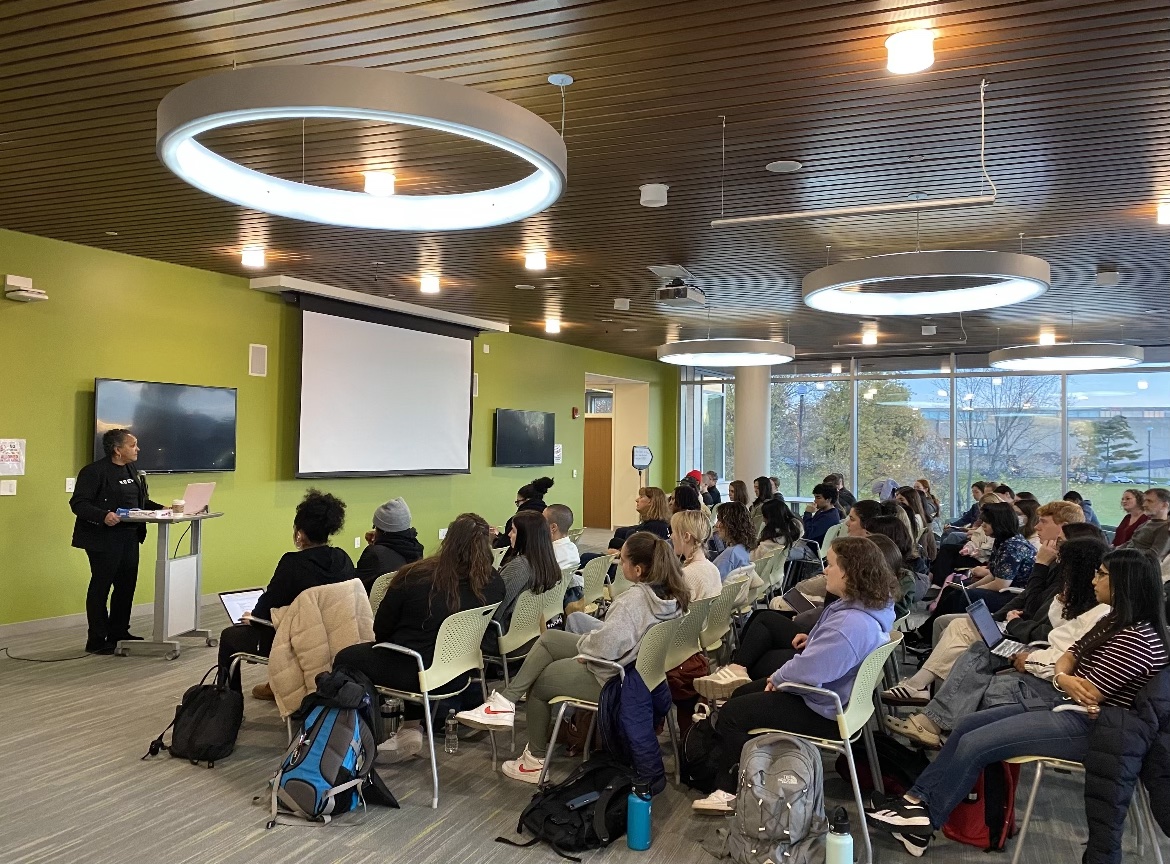On Nov. 15, the Social and Behavioral Science Dean’s Student Advisory Council welcomed Andrea James to campus to talk about her professional and personal experience surrounding the incarceration of women, and the impact it has on their children and communities.
James is the founder and executive director of the National Council for Incarcerated and Formerly Incarcerated Women and Girls, the founder of Families for Justice as Healing, the author of “Upper Bunkies Unite: And Other Thoughts on the Politics of Mass Incarceration” and the creator of the #FreeHer movement.
A formerly incarcerated woman and criminal defense attorney, James has used her own experiences to advocate for ending incarceration for women and girls, as well as spreading awareness about the living conditions they face in state and federal prisons and jails.
“I was privileged when I went to prison,” James said. “I got to self-surrender. I was a lawyer. My family drove me in a caravan to prison as if we were going on another one of our family vacations, except it was very different when we arrived,” she said.
“I’m not the poster woman for incarceration,” she continued. “I walked into prison with resources, with a family, with a supportive husband that continued to raise our children during my absence. Unlike the other women I shared cells with, I never had to worry about where my children were, if they were eating or if they’re safe.”
When in prison, James said she witnessed women grieve the loss of their children, their loved ones and in most cases, their lives. James recounted her and others’ experiences eating expired food, ice crystals forming from the cold winter nights and not being able to afford feminine hygiene products while incarcerated.
“The strength of the women that I met is unbelievable. The determination they have. These are women who are serving life with no parole sentences. Women who had been away from their children for never mind 24 months, but 24 years,” said James to soft applause.
Elijah Fortune, a senior communication major, was one of many that was moved by James’ story. “I was inspired and motivated towards her advocacy for the alarming increase of a rate in women incarceration. Listening to the passion she has towards the topic and her first-hand experience makes me feel optimistic about changing the current dynamic of it,” he said.
Fortune says he was eager to support the movement and hopes everyone else was equally as moved. “I hope that they feel inclined in some type of way to help do a little change for the issue, too.”
Zahriana Newson Gadsden, a senior communication and journalism double major, is a long-time family friend of James. “When SBS needed nominees for a guest speaker, I immediately thought of Mrs. Andrea James. She’s like a grandmother to me, and I’ve been hearing her story since I was a little girl.”
Gadsden has been present since James’s release from prison, and has attended meetings, protests and events in support of the movement. She emphasized that women in prisons all have a story and that inviting James to share her story created a chance to switch the narrative of those that believe people always deserve to be in prison. “People don’t think about certain things. They’re so quick to believe that if someone is incarcerated, they deserve to be in there, you know?”
She paused for a moment and said, “that’s not always the case. We have women that actually work for the National Council who were wrongly convicted and served decades. We have women who took the blame for their husbands or boyfriends and served the time for it when they didn’t have to. There’s people who do this and often don’t come home.”
A couple of videos were displayed during the meeting, one of which is titled 6 Ds Until She’s Free. The 6 Ds — a step-by-step goal towards abolition of the incarceration of women and girls created by what the National Council for Incarcerated and Formerly Incarcerated Women and Girls — include document, decriminalize, divert, decarcerate, divest and dismantle and dream.
When asked about the hardships post-prison, James shared her experience after serving her two-year sentence. “My biggest struggle was integrating back into my family,” she said. “You go from being the center of the family, and the one that takes care of everything, to your family having to live without you.”
She left behind her 5-month-old son when she went into prison and returned six days after his second birthday. “You’re coming back into a family that has figured out how to survive without you, and that is a struggle as a mom. It hurt me.”
James began working on her abolition movement while in prison and said that she was fortunate to have only served two years, as there are women still facing years ahead. The crowd was silent as James listed the names of those still in prison. Despite losing many resources and connections during her sentence, she took matters into her own hands to spread awareness straight out of prison. Without being able to practice law, it was difficult to start a movement from scratch.
James envisions the future of FJAH and the movement continuously acclimating and changing the lives of women and girls. She wants to extend her arms to newly freed women and girls, and encourage them to start making connections and live their life.
“First, go hike the Himalayas. Seriously. We want you to find life. If you choose, after giving yourself the space to figure out who you are, what you want to do — whether it is to watch the sunset or going to a beach — go and do that. That is part of self-care we are big on. We have to provide self-care because prisons couldn’t, but if you insist you can’t do that, become a part of this movement. We’re here,” she said.
Juliannie Ayala can be reached at [email protected].



















